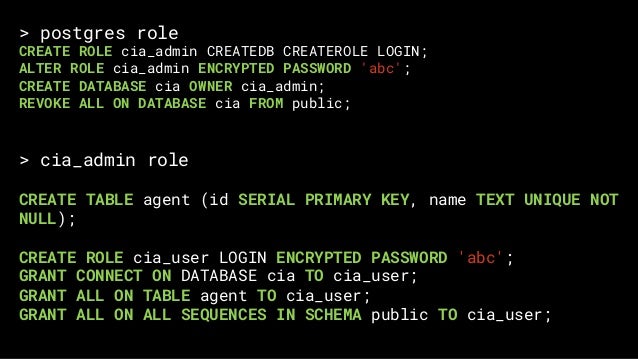
This is not possible according to the SQL standard. Not being _SYSTEM, the owner cannot revoke these rights. The SQL standard provides for a USAGE privilege on other kinds of objects: character sets, collations, translations.
In the SQL standar sequences only have a USAGE privilege, which controls the use of the NEXT VALUE. Beschreibung Sie können Berechtigungen für verschiedene Datenbankobjekte in PostgreSQL GRANT und REVOKE. Wir werden uns ansehen, wie Sie Berechtigungen für Tabellen in PostgreSQL gewähren und entziehen. These variants are similar in many ways, but they are different enough to be described separately.
Currently, to grant privileges in PostgreSQL to only a few columns, you must create a view having the desired columns and then grant privileges to that view. This PostgreSQL tutorial explains how to grant and revoke privileges in PostgreSQL with syntax and examples. You can GRANT and REVOKE privileges on various database objects in PostgreSQL. I am using Postgres 9. The PRIVILEGES key word is optional in PostgreSQL , though it is required by strict SQL. PostgreSQL Privileges, Grant , Revoke: When an object is create it is assigned an owner.

Normally an owner has the role to execute certain statements. For most kinds of objects, the initial state is that only the owner (or a superuser) can do anything with the object. To allow other roles to use it, privileges must be granted. PostgreSQL - PRIVILEGES - Whenever an object is created in a database, an owner is assigned to it.
The owner is usually the one who executed the creation statement. I have a group role called staff and would like to grant all (or certain) privileges to this role on tables in a particular schema. How can I query all GRANTS granted to an object in postgres ? For example I have table mytable: GRANT SELECT, INSERT ON mytable TO userGRANT UPDATE ON mytable TO. How to GRANT rights to modify a table ? Hello, A very annoying problem with Postgres is the following one : As postgres user, I give all rights to all objects of a. By default new users will have permission to create tables. If you are planning to create a read-only user , this is probably not what you want.

To create a true read-only user with PostgreSQL 9. When I grant the privileges as the owner of the schema, testuser can read the table: test OK. Is there an alternative to achieving the same result? The to your questions come from the online PostgreSQL 8. This chapter provides a list of the PostgreSQL SQL commands , followed by the precise syntax rules for each of these commands.
GRANT ALL PRIVILEGES ON DATABASE grants the CREATE, CONNECT, and TEMPORARY privileges on a database to a role (users are properly referred to as roles). This set of commands is taken from the psql command-line tool. I thought it might be helpful to mention that, as of 9.
Keine Kommentare:
Kommentar veröffentlichen
Hinweis: Nur ein Mitglied dieses Blogs kann Kommentare posten.